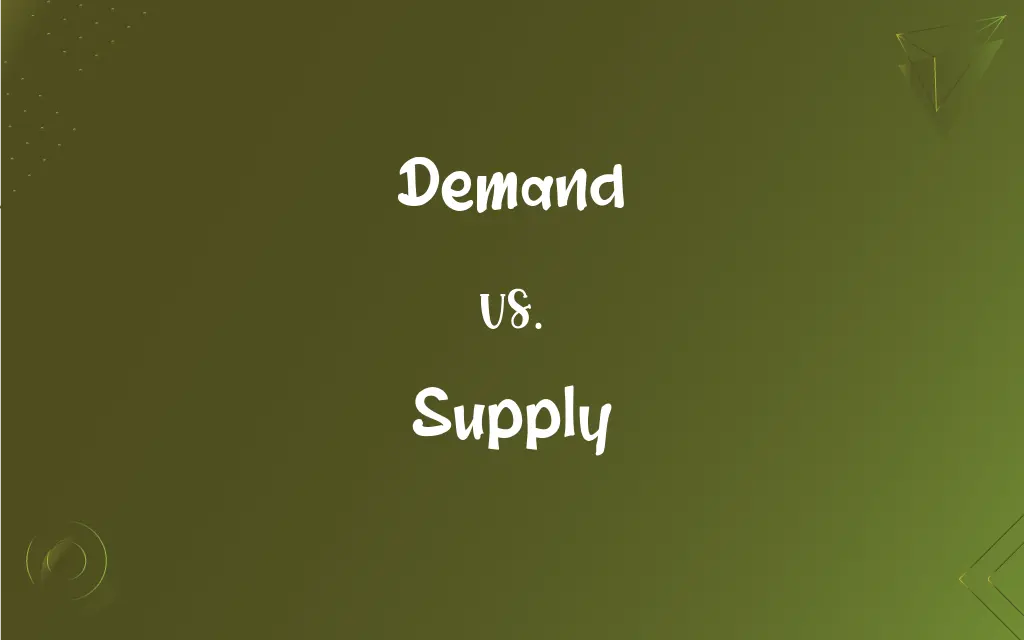Demand vs. Supply: What's the Difference?
Edited by Aimie Carlson || By Harlon Moss || Updated on October 20, 2023
Demand refers to the desire for a product or service, while supply is the quantity of that product or service available in the market.

Key Differences
Demand, in economic terms, represents the quantity of a product or service that consumers are willing and able to purchase at various prices. It typically has an inverse relationship with price, meaning as price increases, demand usually decreases. Supply, on the other hand, signifies the quantity of a product or service that producers are willing and able to offer for sale at different prices. As price rises, the supply generally rises, indicating a direct relationship between price and supply.
Understanding the dynamics between demand and supply is crucial for predicting market behavior. For instance, when the demand for a product exceeds its supply, prices tend to rise. Conversely, when the supply of a product surpasses its demand, prices tend to fall. Thus, equilibrium is achieved when the quantity demanded equals the quantity supplied, leading to market stability.
External factors can influence both demand and supply. For example, a promotional campaign can spike the demand for a product, whereas a disruption in raw material availability can limit its supply. Similarly, technological advancements can enhance production capacities, increasing supply, while shifts in consumer preferences can either bolster or diminish demand.
While both demand and supply are fundamental concepts in economics, they operate on different sides of the market. Demand is driven by consumers and their needs and wants, while supply is driven by producers and their capacity and willingness to produce.
Comparison Chart
Definition
Desire to purchase a product/service
Quantity of product/service available for sale
ADVERTISEMENT
Relationship with Price
Typically inverse (price up, demand down)
Direct (price up, supply up)
Driven By
Consumer needs and wants
Producers' capacity and willingness
Affected by External Factors
Yes (e.g., consumer preferences, income)
Yes (e.g., production costs, technological advancements)
Market Result when Exceeds
Price rise
Price fall
Demand and Supply Definitions
Demand
The act of seeking information or answers.
The journalist's demand for transparency was denied.
ADVERTISEMENT
Supply
The amount of a product available for purchase.
The supply of fresh produce is limited during winters.
Demand
The desire for a specific product or service.
The demand for electric cars is rising rapidly.
Supply
To compensate for a deficiency.
Solar panels supply energy on sunny days.
Demand
Quantity of goods consumers are willing to buy at a certain price.
The demand for luxury goods decreases during economic downturns.
Supply
An act of providing or distributing.
The relief agency is responsible for the supply of essentials to disaster-hit areas.
Demand
A formal request or claim.
The union put forward a demand for higher wages.
Supply
To provide or furnish with.
The company will supply the necessary equipment for the project.
Demand
An urgent need or requirement.
There's a high demand for skilled labor in the tech industry.
Supply
A stock or store of something.
We have a limited supply of these vintage items.
Demand
To ask for urgently or peremptorily
Demand an investigation into the murder.
Demanding that he leave immediately.
Demanded to speak to the manager.
Supply
To make available for use; provide
Does the hotel supply towels?.
Demand
To claim as just or due
Demand repayment of a loan.
FAQs
What is the basic principle of demand?
As price rises, demand typically decreases, and vice versa.
How is supply different from stock?
Supply refers to the quantity offered for sale, while stock is the actual quantity on hand.
What is the law of supply?
As price increases, the quantity supplied usually increases, and vice versa.
How does scarcity impact supply?
Scarcity, or limited availability, can reduce supply and drive prices up.
Can supply be zero for a product?
Yes, if producers aren't willing or able to offer a product, its supply can be zero.
How does competition impact demand and supply?
Increased competition can drive prices down, potentially affecting both demand and supply dynamics.
What happens when demand and supply are in equilibrium?
The quantity demanded equals the quantity supplied, resulting in stable prices.
Can supply exceed demand?
Yes, when supply exceeds demand, it often leads to a decrease in prices.
Can supply and demand principles apply to services?
Yes, these principles are applicable to both goods and services.
What is "elasticity" in terms of demand?
Elasticity measures the responsiveness of demand to changes in price.
Can government policies affect supply?
Yes, regulations, subsidies, and taxes can influence the quantity supplied.
What is the difference between "quantity demanded" and "demand"?
Quantity demanded refers to a specific amount at a specific price, while demand is the overall desire for a product.
How do subsidies impact supply?
Subsidies can increase supply by reducing the production costs for suppliers.
How do external factors impact demand?
External factors like consumer preferences, income, and advertising can influence demand.
How do technological advancements impact supply?
They can increase supply by enhancing production efficiency.
What's meant by "supply chain"?
The sequence of processes involved in the production and distribution of a commodity.
How does future expectation impact demand?
If consumers expect future price rises or shortages, current demand might increase.
Can a product have high demand but low supply?
Yes, this situation can lead to price increases.
What is a demand curve?
A graphical representation showing the relationship between price and quantity demanded.
What factors can shift the demand curve?
Changes in income, tastes, expectations, and the prices of related goods can shift the demand curve.
About Author
Written by
Harlon MossHarlon is a seasoned quality moderator and accomplished content writer for Difference Wiki. An alumnus of the prestigious University of California, he earned his degree in Computer Science. Leveraging his academic background, Harlon brings a meticulous and informed perspective to his work, ensuring content accuracy and excellence.
Edited by
Aimie CarlsonAimie Carlson, holding a master's degree in English literature, is a fervent English language enthusiast. She lends her writing talents to Difference Wiki, a prominent website that specializes in comparisons, offering readers insightful analyses that both captivate and inform.
































































